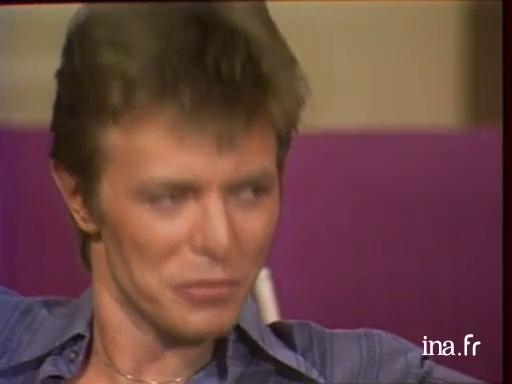Michel Drucker
You know that by inviting David Bowie I invited a star, an idol.
Hello David and thank you for accepting our invitation.
I didn't know that it would cause such chaos and so many photographs, we've never seen that I believe on the set.
Is that your life every day?
David Bowie
(English)
Michel Drucker
He's modest. I know that in Tokyo, in London and abroad.
David Bowie
(English)
Michel Drucker
In Bangkok, there are not so many! Right?
I'll ask the photographers to please move back, as we need to speak to David Bowie a bit.
That won't be easy due to sound problems, there you are.
It seems like I'm welcoming Jimmy Carter.
David Bowie
(English)
Michel Drucker
David Bowie, thank you for having accepted our invitation, you don't do many interviews, you do only a bit of television.
And I'd like to know what you think of everything that goes on around you, you are thirty years old, and have already had a ten to twelve year career.
David Bowie
(English)
Michel Drucker
What's your impression?
David Bowie
(English)
Michel Drucker
Your life is made up of constant travelling.
David Bowie
(English)
Michel Drucker
It has been like that already for about ten years.
So what the French perhaps don't know, your fans in any case, anyway I will remind them, is that David Bowie, you came to France ten or twelve years ago.
And you made your French debut at the Golf Drouot. It was the place to be for rock groups at that time.
Do you remember that time?
David Bowie
(English)
Michel Drucker
He came from the club.
David Bowie
(English)
Michel Drucker
The first photo session was done in the street.
David Bowie
(English)
Michel Drucker
And there was a café nearby.
What music did you like and what did you play at that time?
David Bowie
(English)
Michel Drucker
Punk rock, not exactly, but it reminds you a bit of what was called punk music, therefore he was a bit of a pioneer, he already made this music ten years ago.
Your life has changed a little bit in the past few years as you are also an actor now.
The film, it was, I have the title there, will you remind me in English, it's "The man who fell to earth".
It's a very important experience.
David Bowie
[English]
Michel Drucker
He wanted to become a director, and that therefore gave him the chance to take a few classes, a science fiction film? Do you like science fiction films?
David Bowie
[English]
Michel Drucker
It's a bit science fiction, but not completely, that's the style of the film.
David Bowie
[English]
Michel Drucker
The character that he played comes from space, doesn't he? Right.
I'd now like to know why this transformation?
I find it very difficult to recognise you because of all the make up, plus this strange expression which made you quite a fascinating character for the photographers and for young audiences all over the world.
David Bowie
[English]
Michel Drucker
So each time he changed character, he also changed physically.
David Bowie
[English]
Michel Drucker
And therefore for, for these last two albums, the two latest ones, he has changed character and has therefore changed physically.
David Bowie
[English]
Michel Drucker
He is exactly himself for that.
David Bowie
[English]
Michel Drucker
Do you like the cinema? Would you like to become a star of the big screen?
David Bowie
[English]
Michel Drucker
He's going to make five films with five different directors, five different films.
David Bowie
[English]
Michel Drucker
And after this experience, he'd like to try his hand at directing.
What kind of cinema do you like and which are the European or French directors that you would like to experience?
David Bowie
[English]
Michel Drucker
Francois Truffaut, Fassbinder. He likes somewhat intimist films , such as Fritz Lang, somewhat intimist films.
David Bowie
[English]
Michel Drucker
And you don't like films, the big musical-type super productions?
David Bowie
[English]
Michel Drucker
He prefers much smaller films, made by artists, Thank you very much.
Francois, there you have it, he talked about Francois Truffaut, our friend David Bowie is a strange character who loves both Truffaut and Fassbinder films and the old German expressionist and non intimist Fritz Lang.
Thank you so much for your time.




























